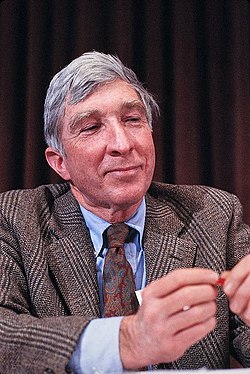John Updike Quote
I felt the superb iron of Barth’s paragraphs, his magnificent seamless integrity and energy in this realm of prose—the specifically Christian—usually conspicuous for intellectual limpness and dishonesty. Man is a riddle and nothing else, and his universe, be it ever so vividly seen and felt, is a question.… The solution of the riddle, the answer to the question, the satisfaction of our need is the absolutely new event.… There is no way which leads to this event: here I thought I had it, in The Task of the Ministry, but no, the passage, though ringing, did not have quite the ring impressed, three decades earlier, upon my agitated inner ear. Farther into the essay, I stumbled on a sentence, starred in the margin, that seemed to give Dale Kohler’s line of argument some justification: In relation to the kingdom of God any pedagogy may be good and any may be bad; a stool may be high enough and the longest ladder too short to take the kingdom of heaven by force. By force, of course: that was his blasphemy, as I had called it. The boy would treat God as an object, Who had no voice in His own revelation.
I felt the superb iron of Barth’s paragraphs, his magnificent seamless integrity and energy in this realm of prose—the specifically Christian—usually conspicuous for intellectual limpness and dishonesty. Man is a riddle and nothing else, and his universe, be it ever so vividly seen and felt, is a question.… The solution of the riddle, the answer to the question, the satisfaction of our need is the absolutely new event.… There is no way which leads to this event: here I thought I had it, in The Task of the Ministry, but no, the passage, though ringing, did not have quite the ring impressed, three decades earlier, upon my agitated inner ear. Farther into the essay, I stumbled on a sentence, starred in the margin, that seemed to give Dale Kohler’s line of argument some justification: In relation to the kingdom of God any pedagogy may be good and any may be bad; a stool may be high enough and the longest ladder too short to take the kingdom of heaven by force. By force, of course: that was his blasphemy, as I had called it. The boy would treat God as an object, Who had no voice in His own revelation.
Related Quotes
About John Updike
Hundreds of his stories, reviews, and poems appeared in The New Yorker starting in 1954. He also wrote regularly for The New York Review of Books. His most famous work is his "Rabbit" series (the novels Rabbit, Run; Rabbit Redux; Rabbit Is Rich; Rabbit at Rest; and the novella Rabbit Remembered), which chronicles the life of the middle-class everyman Harry "Rabbit" Angstrom over the course of several decades, from young adulthood to death. Both Rabbit Is Rich (1981) and Rabbit at Rest (1990) were awarded the Pulitzer Prize.
Describing his subject as "the American small town, Protestant middle class", critics recognized his careful craftsmanship, his unique prose style, and his prolific output – a book a year on average. Updike populated his fiction with characters who "frequently experience personal turmoil and must respond to crises relating to religion, family obligations, and marital infidelity".
His fiction is distinguished by its attention to the concerns, passions, and suffering of average Americans, its emphasis on Christian theology, and its preoccupation with sexuality and sensual detail. His work has attracted significant critical attention and praise, and he is widely considered one of the great American writers of his time. Updike's highly distinctive prose style features a rich, unusual, sometimes arcane vocabulary as conveyed through the eyes of "a wry, intelligent authorial voice that describes the physical world extravagantly while remaining squarely in the realist tradition". He described his style as an attempt "to give the mundane its beautiful due".
